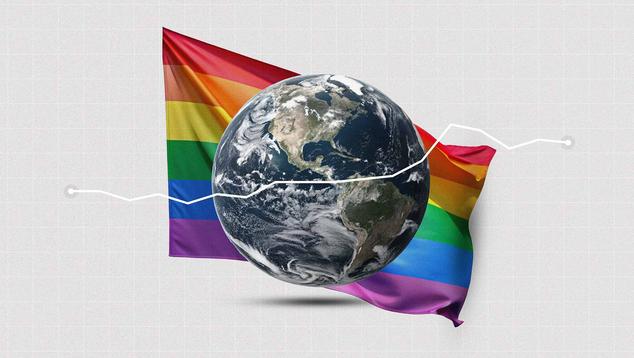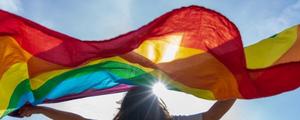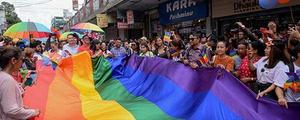LONDON — This Pride Month, new Gallup data reveal a persistent global divide in whether people believe their own communities are good places for gay and lesbian people to live. In 2024, a median of 39% across more than 120 countries said their city or area was a good place for gay and lesbian people, slightly below the 45% who said it was not.
Despite this division, global views have changed considerably over time. When Gallup began tracking these perceptions in 2007, less than half as many people viewed their local areas as good places for gay and lesbian people (23%) rather than not good places (55%). Since 2018 — apart from fluctuations in 2020 and 2021 — this gap has narrowed as more adults have perceived their local areas as a good place for gay and lesbian people, and results have remained relatively stable since 2022. The 39% who now view their area as a good place is nearly double the 2007 percentage.
These numbers differ slightly from past Gallup reports. Previously, Gallup used population-weighted averages, which gave more weight to larger countries. But in recent years, including 2024, Gallup couldn't ask this question in about 20 countries — including those with large populations such as China, Pakistan, Russia and Ethiopia — because of sensitivities.
The absence of these countries makes a big difference to the overall population-weighted average. Using the global median — not weighted by population size — instead provides a fairer picture. In 2024, the median (39%) who said their area was a good place for gay and lesbian people to live was lower than the weighted average (47%), but both have trended in the same direction over time.
Perceptions Improve in Countries Where Same-Sex Relationships Are Legal
Since Gallup began measuring global attitudes, many countries have introduced legal changes affecting gay and lesbian people. There has been a steady increase in both the number of countries where same-sex sexual relationships are legal and those that recognize same-sex marriage, though the former remains far more common than the latter. While outright criminalization has become less common, gay and lesbian people often face severe penalties, including imprisonment or death, in countries where it remains illegal.
Since 2007, increases in seeing communities as a good place for gay and lesbian people have occurred mostly in countries where same-sex relationships are — or have become — legal. In 2024, a median of 46% across 80 countries viewed their local areas as good places for gay and lesbian people, up from 32% in 2007.
By contrast, no such upward shift has occurred in 24 countries where same-sex relationships remain illegal. In these countries, a median of only 11% in 2024 said their area was a good place for gay or lesbian individuals, unchanged from 2007 and four times lower than in countries where such relationships are legal.
These findings underscore the link between legal recognition and social attitudes. While legal protections can influence social norms and help reduce stigma, they also reflect broader societal shifts. At the same time, the lack of change in countries where same-sex relationships remain illegal highlights persistent inequalities in the treatment of gay and lesbian people globally.
Clear Regional Divides in Best Places to Live for Gay and Lesbian People
Some countries are seen as far better places for gay and lesbian people to live than others. In Nordic countries such as Iceland (93%), Sweden (90%), Norway (89%) and Finland (85%), strong majorities say their local areas are good places for gay and lesbian people. Australia and New Zealand also rank among the top 10 globally.
In contrast, few in parts of Africa and post-Soviet Eurasia share that sentiment. Just 2% in Gambia and Senegal, and similarly low numbers in Malawi (3%) and Ghana (6%), say their areas are good places for gay and lesbian people. Across the Caucasus and Central Asia, countries like Armenia (3%), Azerbaijan (4%), Kazakhstan and Kyrgyzstan (both 6%) report similarly low levels.
Notably, all post-Soviet countries in the bottom 10 countries globally (where Gallup is able to ask the question) permit same-sex sexual relationships, indicating that legal status alone does not ensure broader social acceptance. All of the bottom 10 countries report much higher levels of hospitality for immigrants and ethnic minorities than for gay and lesbian people, underscoring the unique stigma that persists in certain parts of the world.
Bottom Line
While more of the world sees itself as a good place for gay and lesbian people to live — in line with global legislative changes — significant regional divides persist, particularly in countries where same-sex relationships are outlawed.
Even countries where same-sex relationships are legal can have low levels of perceived hospitality toward gay and lesbian people, unlike other minority groups. This Pride Month, Gallup’s global data show how the world has changed in relation to views of gay and lesbian people, and how it has not.
Stay up to date with the latest insights by following @Gallup on X and on Instagram.
For complete methodology and specific survey dates, please review Gallup's Country Data Set details.
Learn more about how the Gallup World Poll works.




